|
|
|
Sort Order |
|
|
|
Items / Page
|
|
|
|
|
|
|
| Srl | Item |
| 1 |
ID:
171078
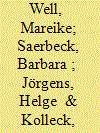

|
|
|
|
|
| Summary/Abstract |
International public administrations (IPA s) play a significant role for the success of multilateral negotiations. As the bureaucratic bodies of international organizations, they are deeply involved in international negotiations, but receive little credit for their outcomes. By studying the administrative styles of the Secretariat of the UN Framework Convention on Climate Change (UNFCCC), this article arrives at an understanding of how this IPA aims at contributing to the outcome of multilateral climate change negotiations. Administrative styles can be conceived of, ideal typically, as being entrepreneurial or servant-like. The article observes that, despite a prohibitively strict mandate as a technocratic facilitator, the UNFCCC Secretariat adopts an entrepreneurial style at the policy initiation stage and a cautiously entrepreneurial style during the policy formulation phase. It has acquired a distinctive actor quality in the climate regime, motivated by a strong commitment to furthering meaningful cooperation and driving the UNFCCC process toward ambitious climate policies.
|
|
|
|
|
|
|
|
|
|
|
|
|
|
|
|
| 2 |
ID:
171085
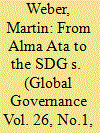

|
|
|
|
|
| Summary/Abstract |
The Alma Ata Declaration of 1978 proclaimed “health for all by the year 2000.” In 2019 health is mainstreamed through the United Nations’ 2030 Sustainable Development Goals (SDG s) initiative. Contributing to critical analysis of global health governance (GHG), this article reconstructs the normative premises of the Alma Ata Declaration, the political project it represented, and the successful cases it was inspired by. It contrasts this with an account of the emergence and gradual consolidation of the GHG agenda that is today reflected in the SDG s. The calls for a return to the Alma Ata Declaration resonate strongly among human rights advocates, community activists, and the medical profession. This is because of the socially exclusionary effects of the dominant health governance agenda shaped by distinctively neoliberal premises. The article argues that in the final analysis the two different approaches reflect very different ideas and ideals about “who global health governance is for.”
|
|
|
|
|
|
|
|
|
|
|
|
|
|
|
|
| 3 |
ID:
171081
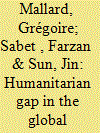

|
|
|
|
|
| Summary/Abstract |
Since the late 1990s, targeted sanctions and general humanitarian sanctions exemptions have aimed at avoiding the disastrous humanitarian consequences of comprehensive sanctions. In parallel, global banks in charge of administering the international trade of vital goods (food and medicine) have received guidance on how to implement risk-based approaches to avoid completely blockading sanctioned jurisdictions. But these efforts have failed. This article asks: Why has the governance of sanctions and sanctions exemption failed, and what can be done to fix the problem? It argues that a hybrid form of governance in the field of sanctions is responsible for current humanitarian problems. Based on more than eighty interviews with treasury officials, sanctions experts, compliance officers, and others, and taking the international trade of vital goods in Iran as an example, this article assesses various fixes to the governance failures and solutions to address the payment problems that exporters of vital goods in sanctioned jurisdictions face.
|
|
|
|
|
|
|
|
|
|
|
|
|
|
|
|
| 4 |
ID:
171073


|
|
|
|
|
| Summary/Abstract |
This article contributes with a novel systematic theoretical and empirical exploration of why states find a nonpermanent seat in the UN Security Council attractive. Three conceptualizations of power—to influence, to network, and to gain status—guide the empirical analysis. A telephone interview survey with diplomatic staff at Member States’ permanent missions to the United Nations in New York provides readers with original and unique empirical knowledge of state perceptions of power. The candidature for a seat comes with expectations of influencing decision-making, despite modest estimations of the opportunity to have impact. Opportunities to network and to gain status are not frequent reasons for a candidature. Diplomats’ estimations are nevertheless higher on the opportunity to actually establish relevant relationships and to gain status brought by a seat.
|
|
|
|
|
|
|
|
|
|
|
|
|
|
|
|
| 5 |
ID:
171083


|
|
|
|
|
| Summary/Abstract |
In interstate and international interaction, norm breaking is a frequent occurrence and cause of conflict. This article discusses how to deal with such behavior when it occurs in maritime space. The particularities of distinct maritime spaces and their level of regulation provide distinct opportunities. States may then take a hybrid approach by taking into account international law in more regulated areas, but seeking alternatives in less regulated ones. To discourage norm breaking and to promote cooperative approaches toward shared challenges in maritime space, stronger ocean governance that considers hybridity seems important. The article discusses these aspects in the three cases of the Arctic, the Indian Ocean, and the Mediterranean and derives first lessons for strengthened ocean governance.
|
|
|
|
|
|
|
|
|
|
|
|
|
|
|
|
| 6 |
ID:
171072
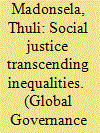

|
|
|
| 7 |
ID:
171076
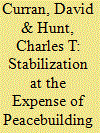

|
|
|
|
|
| Summary/Abstract |
The “uploading” of stabilization to UN peacekeeping presents conceptual, political, and practical challenges to the UN’s role in global governance and international conflict management. While scholarly research on stabilization has generally focused on militarization, its relationship to peacebuilding in the context of UN peacekeeping is underexplored. This article examines that relationship. A survey of UN policy frameworks highlights the simultaneous emergence of stabilization and clear expressions of peacebuilding. The article then draws on fieldwork in Mali and the Democratic Republic of Congo to illustrate how stabilization is displacing peacebuilding in the practices of UN peacekeeping. The article argues that the politics of stabilization impede local forms of peacebuilding, at odds with the “Sustaining Peace” agenda, and risks jeopardizing the lauded conflict resolution potential of UN peacekeeping.
|
|
|
|
|
|
|
|
|
|
|
|
|
|
|
|
| 8 |
ID:
171077


|
|
|
|
|
| Summary/Abstract |
Women’s greater presence in informal peace processes is often noted in works on peace processes, but there has been little systematic evidence about this involvement. This article is the first systematic study of women’s participation in informal peace processes. We find that women are a significant presence in civil society efforts to forge peace outside formal negotiation rooms: nearly three-fourths of identifiable informal peace processes have clear evidence of involvement from women’s groups. This research indicates that women advocate to be included in formal peace processes, work to legitimate formal negotiations and organize for peace, advocate for the inclusion of women’s rights issues in the final peace agreement, provide information on human rights violations to participants in the formal peace process, engage in local conflict resolution, and advocate as partisans for one or another side in the conflict.
|
|
|
|
|
|
|
|
|
|
|
|
|
|
|
|
|
|
|
|
|